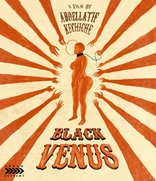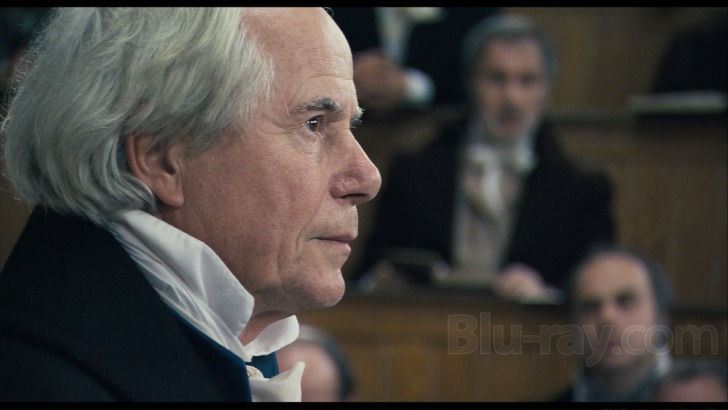Black Venus Blu-ray Movie
HomeBlack Venus Blu-ray Movie 
Vénus noireArrow | 2010 | 162 min | Not rated | May 22, 2018

Movie rating
6.3 | / 10 |
Blu-ray rating
| Users | 0.0 | |
| Reviewer | 3.5 | |
| Overall | 3.5 |
Overview
Black Venus (2010)
The story of Saartjes Baartman, a Black domestic who, in 1808, left Southern Africa, then ruled by Dutch settlers, for Europe, following her boss Hendrick Caesar , hoping to find fame and fortune there. Once in London her master turned manager does nothing but exhibit her as a freak in a phony and humiliating carnival show. After a series of troubles caused by their act, Caesar, Saartje and their new friend, bear-tamer Réaux, head for Paris where once again, and against her will, she has to mimic savagery and expose her body, first in carnivals, then in the aristocratic salons of Paris, later on among the libertines and finally in brothels where she ends up being a prostitute. In the meantime, French anatomists will have taken an interest in her unusual anatomy (enormous buttocks and labia) only to declare her the missing link from ape to man. In 1815, aged only 27, she dies alone, of a combination of pneumonia and venereal disease.
Starring: Yahima Torres, Andre Jacobs, Olivier Gourmet, Elina Löwensohn, François MarthouretDirector: Abdellatif Kechiche
| Foreign | Uncertain |
| Drama | Uncertain |
| History | Uncertain |
Specifications
Video
Video codec: MPEG-4 AVC
Video resolution: 1080p
Aspect ratio: 1.85:1
Original aspect ratio: 1.85:1
Audio
French: DTS-HD Master Audio 5.1
French: DTS-HD Master Audio 2.0
Subtitles
English
Discs
Blu-ray Disc
Single disc (1 BD)
Playback
Region A (B, C untested)
Review
Rating summary
| Movie | 3.5 | |
| Video | 4.0 | |
| Audio | 4.5 | |
| Extras | 1.0 | |
| Overall | 3.5 |
Black Venus Blu-ray Movie Review
The Greatest Showwoman?
Reviewed by Jeffrey Kauffman May 24, 2018One of the conceits of the relatively recent kinda sorta biography of one Phineas Taylor Barnum, The Greatest Showman, was that the “freaks” the impresario wrangled together for his show were actually happy to parade their “abnormalities” under the aegis of their mentor, as evidenced by the film’s Oscar nominated anthem, “This Is Me” (a song which probably not so coincidentally tends to remind of Lady Gaga’s “Born This Way”). For the “flip side” of what being the star attraction in a so-called “freak show” might be like, one need look no further than the often depressing but just as often rather riveting Black Venus, a film based on the real life story of Saartjie Baartman (Yahima Torres, César nominated for this performance), a late 18th — early 19th century South African woman who was “marketed” as the so-called Hottentot Venus throughout Europe, though chiefly in London and Paris. The show featuring Baartman typically had her introduced in a cage as a supposedly unrepentant (and uncontrollable) “savage” who was closer to an animal than a human. She was then allowed a brief moment of “freedom” as her “master”, Hendrik Caezar (Andre Jacobs), titillated the audience with the fear of being attacked, as well as allowing the bravest ticket holders a chance to actually touch Baartman’s prominent buttocks (one of her most defining features, and one that evidently caused considerable thrilled reactions from demure viewers). Black Venus actually begins after Baartman’s death, with a really disturbing “show and tell” at Paris’ Royal Academy of Medicine, where noted physician Georges Cuvier (François Marthouret) unveils a life sized model of Baartman, while he also displays the bottled remains of Baartman’s actual genitalia, a part of her anatomy which, like her derrière, had larger than average elements. Cuvier makes a number of provocative “scientific” points, drawing parallels between Baartman’s physical appearance and orangutans, and also providing his rapt audience with the mummified head of an Egyptian just to prove that Africans couldn’t possibly be related to that particular ethnicity, not just because of physical differences, but due to the “obvious” fact that the Egyptians were undeniably intellectually superior to what Cuvier evidently thinks of as the “missing link” between monkey and Man.

After this probably intentionally disturbing opening vignette, director Abdellatif Kechiche moves his camera in up close to that life sized casting of Baartman, segueing into her life story as if the mannequin itself is remembering things. The film drifts back several years to London, circa 1810, where Baartman is on display in a nightly show that sees her parading before trepidatious audiences, dancing and playing a tiny bowed instrument, and also showing off a parody of how “European ladies” walk. It’s patently offensive to modern day eyes, especially since Caezar keeps her on the end of a leash for much of the show. Only after the audience has left is it revealed that Baartman and Caezar enjoy a relatively normal relationship (at least within the admittedly outré context of things), though Baartman drinks heavily to numb her obvious pain over her exploitation, and Caezar may have carnal designs on his “employee”.
Issues as to how truly willing Baartman is to be paraded in front of people is a recurring element throughout the film, and it’s perhaps interesting to see that this inherently sympathetic character is shown to be a bit ambivalent about it all. Early in the film, she complains to Caezar about being tired and especially about not wanting to be touched, but she repeatedly agrees to performances, and in fact when one of the film’s more or less “set pieces”, a trial where Baartman’s “status” is being decided by British courts, she insists she’s not being coerced into anything and that no abuse is taking place. It casts a somewhat odd light on the character, and despite what some may feel is the film’s over length (close to three hours), there are certain background elements that might have helped to elucidate motivations a bit better.
The film tips over into some fairly salacious material as it continues, with one of Baartman’s “new, improved” marketers pretty much selling her to orgiastic bacchanals where her unusual body delights a jaded crowd. It’s unbelievably disturbing from any number of angles, not the least of which is that some of these performances once again have Baartman tethered to what amounts to a leash.
Black Venus was a bit of an unusual choice for Kechiche, a filmmaker better known then (and in fact to this day) for his “social realism” films that tend to play out in contemporary milieus. That said, as Neil Young (no, not that one) mentions in the sole supplement included on this release (other than a trailer), there are certainly “social realism” concerns underlying this film despite its historical context, with the subjugation of Baartman playing at least somewhat similarly to Kechiche’s treatment of other downtrodden characters in his other films. In reading up on Baartman in preparation for writing this review, I was surprised to learn that the historical Caezar was actually a free black man, something this film avoids for some reason. Personally I think that that fact would have made for an even more penetrating analysis of race relations, in somewhat the same way that a free black in charge of black slaves in the recently reviewed Vazante did. That qualm aside, the film is anchored by a truly remarkable performance by first time actor Torres, who brings both a melancholic vulnerability and an almost feral resilience to her portrayal.
Black Venus Blu-ray Movie, Video Quality 

Black Venus is presented on Blu-ray courtesy of Arrow Academy with an AVC encoded 1080p transfer in 1.85:1. Arrow's insert booklet contains the following fairly generic verbiage on the transfer:
Black Venus was digitally restored by MK2 from original film materials. The film is presented in its original theatrical aspect ratio of 1.85:1 with optional 2.0 and 5.1 soundtracks.The appearance of this transfer is highly dependent on lighting, with exterior or other brightly lit moments looking nicely sharp and well defined, and with an organic looking fine grain field. Darker moments repeatedly have issues with a slightly noisy look, along with what I'd call an almost "video- esque" appearance at times (though not particularly dark, see screenshot 3 for an example of the kind of video look). Grain can clump slightly or look yellow and minor compression artifacts accrue at times (see screenshots 17-18 for some examples). The palette is generally accurate looking, with the film's emphasis on blues and browns resonating quite well. The film is almost nonstop close-ups, something that helps to elevate fine detail levels appreciably (look at screenshot 2 and notice not just the facial hair but the precise accounting of the pattern on the vest).
Black Venus Blu-ray Movie, Audio Quality 

Black Venus offers tracks in both DTS-HD Master Audio 5.1 and LPCM 2.0, though the disc's definition of these being "French" is arguable, since large swaths of the film play out in either Afrikaans or English. One way or the other, this is an often arresting sounding track in its surround version, one buoyed by the consistent use of music and with well populated ambient environmental sounds filling the surround channels. Dialogue is rendered cleanly and clearly and there are no problems with damage or distortion.
Black Venus Blu-ray Movie, Special Features and Extras 

- Neil Young on Abdellatif Kechiche (1080p; 33:16) is actually entitled A Personal Introduction to the Films of Abdellatif Kechiche and features the film critic (not the former partner of Crosby, Stills and Nash, in case anyone is uncertain) discussing six films in some detail, including Black Venus.
- Theatrical Trailer (1080p; 1:25)
Black Venus Blu-ray Movie, Overall Score and Recommendation 

Black Venus is not an "easy" viewing experience, and in fact it repeatedly pushes the envelope in terms of what modern day audiences may perceive as the outright shocking and offensive treatment of a minority woman. That said, Kechiche is arguably a bit self indulgent here, dragging the film out to an unneeded length and dwelling on some of the more salacious aspects of Baartman's short, sad existence. The film features some knockout performances, though, and a rather opulent looking production design. Video has occasional hurdles, but audio is fine, and the supplement with Young is very interesting. Recommended.
Similar titles
Similar titles you might also like

Code Unknown
Code inconnu: Récit incomplet de divers voyages
2000

Babette's Feast
Babettes gæstebud
1987

Capital
Le capital
2012

In a Better World
Hævnen
2010

The Class
Entre les murs
2008

Napoléon
Napoléon vu par Abel Gance
1927

Soleil Ô
Oh, Sun
1967

Electra, My Love
Szerelmem, Elektra
1974

Touki Bouki
1973

Army of Shadows
L'armée des ombres / Better encode than 2011 release
1969

Les Miserables
I miserabili
1934

La Bête Humaine
1938

A Single Girl
La fille seule
1995

Taxi for Tobruk
Un Taxi pour Tobrouk
1960

La Marseillaise
The Marseillaise
1938

Le Plaisir
1952

Le Havre
2011

The Tree of Wooden Clogs
L'albero degli zoccoli
1978

Cobra Verde
1987

Children of Paradise
Les enfants du paradis
1945